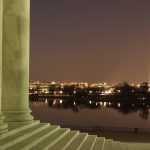 Things are heating up in the lawsuit filed by Songwriters of North America and three of its members (SONA) challenging the new gloss of the Department of Justice (DOJ) on the 75-year-old consent decrees that govern the licensing practices of ASCAP and BMI, the two largest performance rights organizations (PROs). Read more
Things are heating up in the lawsuit filed by Songwriters of North America and three of its members (SONA) challenging the new gloss of the Department of Justice (DOJ) on the 75-year-old consent decrees that govern the licensing practices of ASCAP and BMI, the two largest performance rights organizations (PROs). Read more
Author: Devlin Hartline
CPIP Founders File Amicus Brief on Behalf of 11 Law Professors in Converse v. ITC
 CPIP Founders Adam Mossoff & Mark Schultz filed an amicus brief today on behalf of 11 law professors in Converse v. International Trade Commission, a trademark case currently before the Federal Circuit.
CPIP Founders Adam Mossoff & Mark Schultz filed an amicus brief today on behalf of 11 law professors in Converse v. International Trade Commission, a trademark case currently before the Federal Circuit.
In late-2014, Converse filed a complaint with the International Trade Commission alleging that more than thirty companies, including Skechers, Walmart, New Balance, and Highline, were violating Section 337 of the Tariff Act of 1930 by importing and selling infringing shoes. Read more
Second Circuit Brings Some Sanity Back to Transformative Fair Use
 The Second Circuit handed down an opinion in TCA Television v. McCollum earlier this week holding that a play’s inclusion of Abbott and Costello’s famous “Who’s on First?” routine was not transformative fair use. Given how expansive transformativeness has become lately, especially in the Second Circuit, the opinion is somewhat surprising. Read more
The Second Circuit handed down an opinion in TCA Television v. McCollum earlier this week holding that a play’s inclusion of Abbott and Costello’s famous “Who’s on First?” routine was not transformative fair use. Given how expansive transformativeness has become lately, especially in the Second Circuit, the opinion is somewhat surprising. Read more
FTC’s PAE Study Makes Unsupported Recommendations
 The FTC released its long-awaited study of so-called patent assertion entities, or PAEs, today. As many predicted, the FTC makes several broad recommendations for substantive and procedural reforms. The problem with this, however, is that the study was not designed to reveal the sort of data that could support such policy recommendations. Read more
The FTC released its long-awaited study of so-called patent assertion entities, or PAEs, today. As many predicted, the FTC makes several broad recommendations for substantive and procedural reforms. The problem with this, however, is that the study was not designed to reveal the sort of data that could support such policy recommendations. Read more
Professors Mislead FCC on Basic Copyright Law
Criminal Copyright Infringement is Crime of "Moral Turpitude"
Cross-posted from the Law Theories blog.
 This past Friday, the Board of Immigration Appeals held that criminal copyright infringement constitutes a “crime involving moral turpitude” under immigration law. The Board reasoned that criminal copyright infringement is inherently immoral because it involves the willful theft of property and causes harm to both the copyright owner and society. Read more
This past Friday, the Board of Immigration Appeals held that criminal copyright infringement constitutes a “crime involving moral turpitude” under immigration law. The Board reasoned that criminal copyright infringement is inherently immoral because it involves the willful theft of property and causes harm to both the copyright owner and society. Read more
Federal Circuit Again Finds Computer-Implemented Invention Patent Eligible
 In Tuesday’s McRO v. Bandai decision, the Federal Circuit has once again reversed a district court’s determination that a computer-implemented invention (aka “software patent”) was not patent eligible under Section 101 of the Patent Act. This continues the Federal Circuit’s recent trend of clarifying the Supreme Court’s two-step patent-eligibility test under Mayo and Alice. Read more
In Tuesday’s McRO v. Bandai decision, the Federal Circuit has once again reversed a district court’s determination that a computer-implemented invention (aka “software patent”) was not patent eligible under Section 101 of the Patent Act. This continues the Federal Circuit’s recent trend of clarifying the Supreme Court’s two-step patent-eligibility test under Mayo and Alice. Read more
CloudFlare’s Desperate New Strategy to Protect Pirate Sites
 San Francisco-based CloudFlare has earned a somewhat dubious reputation in the online world. Website owners can set up CloudFlare in just a few minutes, gaining the performance, security, and privacy benefits the service provides. Traffic routed through CloudFlare’s global content delivery network is cached for faster delivery times and protected from numerous online threats. Read more
San Francisco-based CloudFlare has earned a somewhat dubious reputation in the online world. Website owners can set up CloudFlare in just a few minutes, gaining the performance, security, and privacy benefits the service provides. Traffic routed through CloudFlare’s global content delivery network is cached for faster delivery times and protected from numerous online threats. Read more
Do As I Say, Not As I Do: Google’s Patent Transparency Hypocrisy
 It is common today to hear that it’s simply impossible to search a field of technology to determine whether patents are valid or if there’s even freedom to operate at all. We hear this complaint about the lack of transparency in finding “prior art” in both the patent application process and about existing patents. Read more
It is common today to hear that it’s simply impossible to search a field of technology to determine whether patents are valid or if there’s even freedom to operate at all. We hear this complaint about the lack of transparency in finding “prior art” in both the patent application process and about existing patents. Read more
Second Circuit Deepens Red Flag Knowledge Circuit Split in Vimeo
 The Second Circuit’s recent opinion in Capitol Records v. Vimeo is, to put it mildly, pretty bad. From its convoluted reasoning that copyrights under state law for pre-1972 sound recordings are limited by the DMCA safe harbors, despite the explicit statement in Section 301(c) that “rights or remedies” under state law “shall not be annulled or limited” by the Copyright Act, to its gutting of red flag knowledge by limiting it to the nearly-impossible situation where a service provider actually knows that a specific use of an entire copyrighted work is neither fair nor licensed yet somehow doesn’t also surmise that it’s infringing, it’s hard to see how either result is compelled by the statutes, much less how it was intended by Congress. Read more
The Second Circuit’s recent opinion in Capitol Records v. Vimeo is, to put it mildly, pretty bad. From its convoluted reasoning that copyrights under state law for pre-1972 sound recordings are limited by the DMCA safe harbors, despite the explicit statement in Section 301(c) that “rights or remedies” under state law “shall not be annulled or limited” by the Copyright Act, to its gutting of red flag knowledge by limiting it to the nearly-impossible situation where a service provider actually knows that a specific use of an entire copyrighted work is neither fair nor licensed yet somehow doesn’t also surmise that it’s infringing, it’s hard to see how either result is compelled by the statutes, much less how it was intended by Congress. Read more


 In a
In a